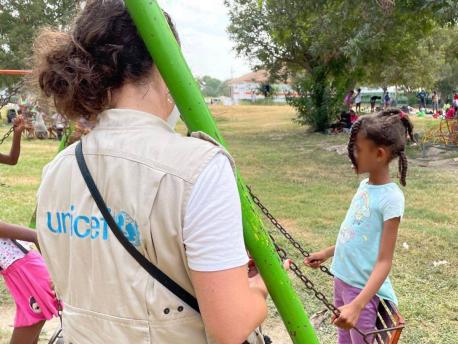
Majority Expelled to Haiti From U.S. Border Are Children and Women
UNICEF, concerned about Haitian children and families being transported from the U.S. border to Haiti, is working to provide those in need with emergency assistance.
According to UNICEF initial estimates, more than two-thirds of all Haitian migrants who have been returned to Port-au-Prince, Haiti in recent days are women and children. Some of them are newborn babies, with specific and immediate needs.
Children and families sent back without adequate protection are even more vulnerable to the factors that drove them to migrate in the first place
“Haiti is reeling from the triple tragedy of natural disasters, gang violence and the COVID-19 pandemic,” said Henrietta Fore, UNICEF Executive Director. “When children and families are sent back without adequate protection, they find themselves even more vulnerable to violence, poverty and displacement – factors that drove them to migrate in the first place.”

A UNICEF staff member sits with a mother and her baby in Ciudad Acuña in Coahuila State, Mexico, across the Rio Grande from Del Rio, Texas, in September 2021. © UNICEF
Initial assessments in Mexico and Haiti suggest that many of the children under 10 years of age were born outside Haiti or have lived most of their lives in another country.
UNICEF estimates that 40 percent of Haitian migrants in Del Rio, Texas are children
UNICEF is also concerned about the situation of Haitian families in Del Rio, Texas, where about 40 percent of Haitian migrants are children, according to UNICEF preliminary estimates. They live in overcrowded and inadequate conditions and need basic humanitarian support.

Children are particularly vulnerable in emergency and crisis situations. Above, children migrating with their families play in a park in Ciudad Acuña, in Mexico's Coahuila state. © UNICEF
UNICEF is working to provide children and families with basic assistance. In Ciudad Acuña, in the Mexican state of Coahuila, UNICEF will facilitate access to child protection services and will deliver drinking water, hygiene kits, mobile toilets and handwashing stations.
UNICEF is working to protect children and provide basic services to those in need
In Haiti, UNICEF will provide returning children with psychosocial support, protection services and education supplies, in coordination with national authorities and the International Organization for Migration.
But more support is needed to provide these families with the lifesaving assistance they need.

Natural disasters, gang violence and the COVID-19 pandemic have pushed families out of Haiti in search of safety. © UNICEF
UNICEF urges all actors to refrain from any use of force at borders, to keep families together, and to properly assess migrants’ protection needs before any decision on return is made. Children should never be returned to situations where their basic safety and well-being are at risk.
“The best interests of children must trump all other considerations,” Fore said.
UNICEF works to protect the rights and well-being of children around the world. You can help.
Top photo: A UNICEF team is in Cuidad Acuña in the Mexican state of Coahuila, across the Rio Grande from Del Rio, Texas, to evaluate the situation of children and families of Haitian origin who are migrating. © UNICEF
HOW TO HELP
There are many ways to make a difference
War, famine, poverty, natural disasters — threats to the world's children keep coming. But UNICEF won't stop working to keep children healthy and safe.
UNICEF works in over 190 countries and territories — more places than any other children's organization. UNICEF has the world's largest humanitarian warehouse and, when disaster strikes, can get supplies almost anywhere within 72 hours. Constantly innovating, always advocating for a better world for children, UNICEF works to ensure that every child can grow up healthy, educated, protected and respected.
Would you like to help give all children the opportunity to reach their full potential? There are many ways to get involved.





